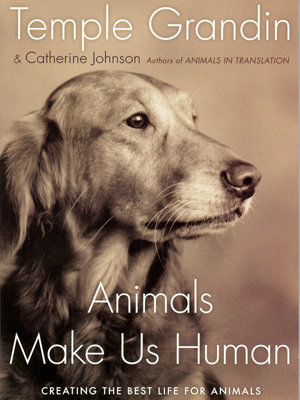 |
Animals Make Us Human: Creating the Best Life for Animals
by Dr. Temple Grandin and Catherine Johnson
Houghton-Mifflin Harcourt, New York, NY, 2009
ISBN 978-0-15101489-7
(In United Kingdom, book title is "Making Animals Happy" and ISBN is: 978-0-7475-9714-8)
Links for ordering:
- Amazon.Com
- BarnesandNoble.Com
- Powell's.Com
|
An Excerpt from Chapter 3: Cats
Preventing Fear at the Vet’s Office – Introducing cats to the veterinarian and the cat carrier
The most frightening place tor cats, even bold ones, is the vets office. To keep a cat calm for medical exams and treatments, you handle it the same way good stock people handle a cow, using the principles of restraint I developed for cattle:
- No sudden jerky motions — use calm, steady movement.
- No slippery metal tops on the examining table. I tell people to bring a bathmat with a rubber backing from home to put on the table. Slipping causes panic in all animals.
- Stroke your cat firmly as a way of applying deep pressure. Do not use pats or light tickle touches.
A student once came up to me after I finished my lecture and said he worked as a veterinary aide. Everyone at his clinic called him the “kitty whisperer,’ he told me, because he was the only person who could calm the cats down when they came in for their appointments. The secret of his success was my principles of restraint for cattle, which he’d read about in Animals in Translation. He tried applying them to cats, and they worked!
Kittens and cats should be trained to feel that a cat carrier is a safe place. Food treats can be fed in the carrier and your cat should be gradually taught to tolerate being locked in the carrier for a longer and longer time. This prevents the car ride to the vet from being a yowling, frightening experience. Your cat should become fully accustomed to the cat carrier before he has to go to the vet or go on a car trip.
When I was a child, we did everything wrong when traveling to our summer house with Bee Lee. Both my mother and I thought that Bee Lee would travel easily like our dog, who just hopped into the car so he could be with us, but Bee Lee had never been trained to stay in a carrier, and he ripped apart the flimsy cardboard box I had put him in. On another trip, he clawed Mother’s head as she was driving down the freeway. Mother had him riding loose because he yowled in the carrier. She mistakenly thought he would be calmer when loose. A bad experience like this can create a permanent fear memory and make it very difficult to train a cat to travel calmly in a carrier. Cats that have had a scary travel experience will probably need tranquilizers before their next trip.
 Click here to return to the Homepage for more information on animal behavior, welfare, and care.
Click here to return to the Homepage for more information on animal behavior, welfare, and care.
 Click here to return to the Animals Make Us Human Table of Contents page and read other chapter excerpts.
Click here to return to the Animals Make Us Human Table of Contents page and read other chapter excerpts.

